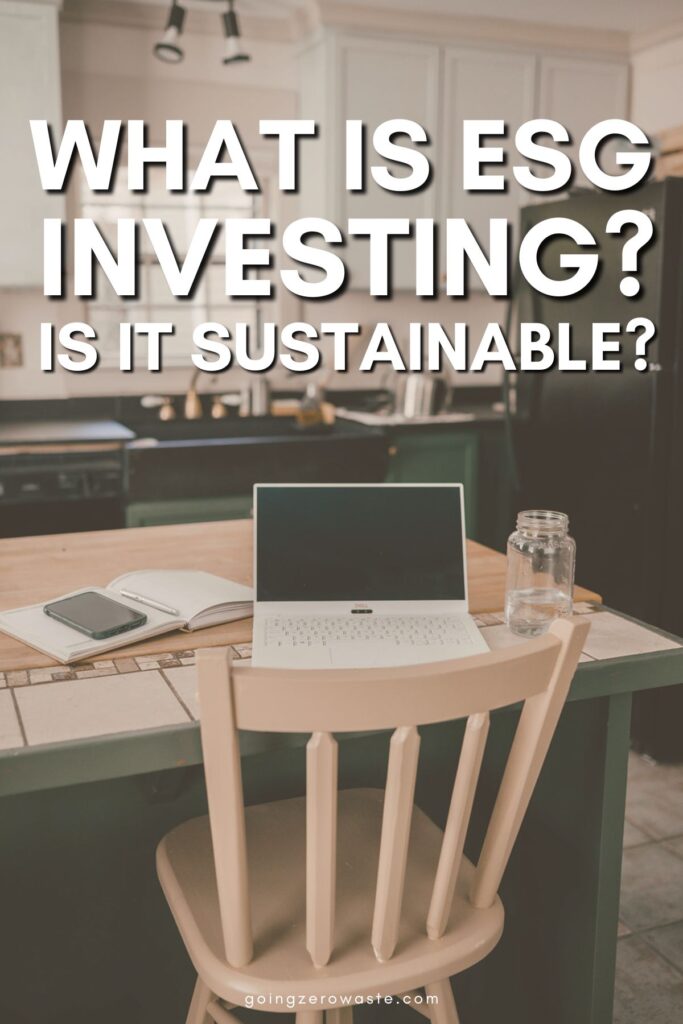Last Updated on August 30, 2024
Have you ever heard of ESG investing before? If you’re interested in making money with the stock market, but want to approach it sustainably, you might want to familiarize yourself with this term.
There are so many kinds of stocks to invest in. Unfortunately, not all of them are created equal, especially when it comes to how they affect the planet and its people. Many stocks, such as oil and gas, only help fund the fossil fuel industry, which is a huge contributor to climate change.

Disclaimer: I am not a financial professional. I am an average person. This post is meant to inform you of what ESG is and how it works, not necessarily what to do.
If you’re going to make money on the stock market, it’s important to know exactly what your money is funding. That’s why looking into ESG stocks is a good option, as they can help you build a more ethical portfolio.
But what exactly is ESG? Is it just greenwashing? Here’s everything you need to know about ESG investing.
what is ESG?
ESG stands for environmental (E), social (S) and governance (G) criteria.
Companies are evaluated based on these three criteria, to see where they stand on ethics and sustainability. They get an ESG score to see what they rank.
Not every stock has an ESG score – however, it’s important to look for them because their score measures the sustainability of an investment with that company.
ESG scores are typically measured on a scale of 0 to 100, with scores below 50 considered poor and scores above 70 considered good.
However, ESG scores can also be rated using letter grades: MSCI, one of the leading rating systems for ESG, considers the highest rating, aka an ESG “leader”, to be AAA and AA; Average is rated A, BBB, or BB; Laggard is rated B or CCC.
Essentially, if an ESG score is high, that’s a good indicator the company doesn’t place profit before people or planet. However, it’s always best to double check and do your own research into a company before investing in them.
Let’s break down what each ESG category factors in.
environmental
This looks into where the company stands on the environment. It analyzes the company’s use of energy, waste, pollution, and natural resource conservation. It also accounts for green energy initiatives (like running offices or factories on solar + wind power).
social
This criteria shows how the company manages relationships with its employees, suppliers, customers, and even its stakeholders. It factors in human rights, employee gender and diversity, customer satisfaction, and company sexual harassment policies.
governance
This criteria addresses how a company’s leadership operates in relation to policies on all kinds of topics, such as audits, diversity, executive pay, large-scale lawsuits, political contributions, inclusion, internal controls, illegal practices, and shareholder rights. Also, a company’s willingness to engage in the sustainability reporting process is analyzed.

how is ESG calculated?
ESG scores are calculated by several different rating agencies using varying methods. There’s no one authority on ESG scores. Most providers outline specific ESG indicators, like climate change effect, but those indicators often differ depending on the provider.
The way providers acquire their data also varies. For example, MSCI ESG Research is one of the largest independent providers of ESG ratings: They use data collected from both company disclosures and government, academic and NGO databases.
This contrasts with the Dow Jones Sustainability Index (DSCI) which uses an industry-specific questionnaire to gather self-reported data from participating companies. The DSCI is invite-only and updated on an annual basis.
It’s best to be aware and do your own research into a company when you have doubts or questions. Most companies will be transparent about their climate policies, for example, on their website – but if they aren’t, that can potentially be a bad sign.

ESG investing: what to know
Here are a few things to consider before creating an ESG portfolio of your own.
- First, decide if you want to DIY it, or find a robo-investor. One robo-investor that is ESG-minded is Betterment, which provides three impact portfolios to choose from: Broad Impact, Climate Impact, and Social Impact.
- If you’d rather DIY your portfolio, it’s important to evaluate your values and double check they align with the ESG stocks you investigate. It’s a good idea to read reviews from independent research firms, like Morningstar, which can show you how a company or fund scores in terms of ESG investing factors.
- Be aware of greenwashing. Yes, it can still happen with ESG stocks. This is when a business exaggerates or even lies about its commitment to environmental, social, and governance (ESG) standards. Make sure to do your research into a company before you invest in them. Check out their website, read their sustainability reports, and check out a third-party site such as Glassdoor. This will help you make more informed decisions moving forward.
RELATED: A Beginner’s Guide to Fossil Fuel Divestment
What do you think of ESG stocks? Let me know in the comments below.



